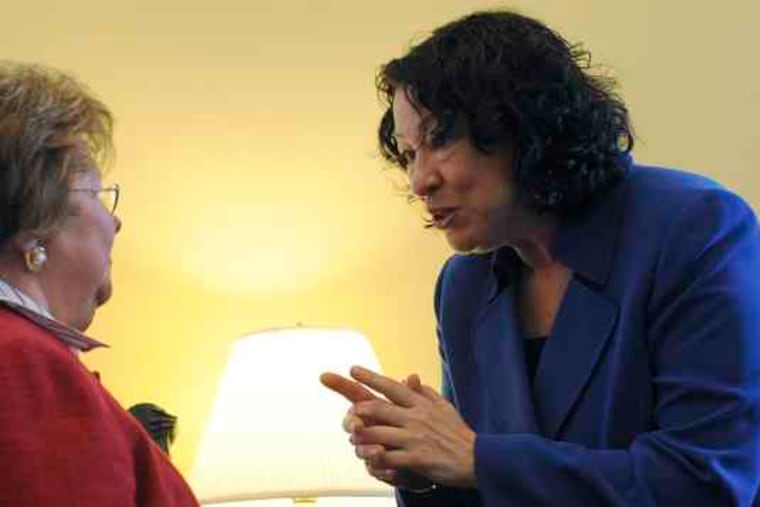Sotomayor impressing senators
In "courtesy calls" on Capitol Hill, the nominee has scored, even with resistant Republicans.

WASHINGTON - Supreme Court nominee Sonia Sotomayor has bonded with female senators about her childhood love of Nancy Drew mysteries and has shared war stories with the Senate's former prosecutors about her days in the gritty Manhattan District Attorney's Office.
Slogging through dozens of personal, one-on-one meetings with senators that amount to a high-stakes job interview, she has impressed her questioners with an engaging personality and life story - even those lawmakers with big reservations about her views on the law.
It's all part of a delicate sales pitch. Senators sometimes are moved as much by the telling personal detail or common hobby as they are by a sterling resume and sharp legal mind.
Sotomayor noticed a bicycle figurine on a shelf in the office of Sen. Amy Klobuchar (D., Minn.) and chatted about her love of cycling. She spoke in Spanish to Cuban-born Sen. Mel Martinez (R., Fla.). She talked about losing her father at an early age with Sen. Richard J. Durbin (D., Ill.), whose father also died when he was young. She gossiped with Democratic senators who support her about how to handle potential critics and the trickier personalities on Capitol Hill.
"I told her the most important thing is to be yourself, because she's such a powerful presence and such a powerful person," said Sen. Chuck Schumer (D., N.Y.), her unofficial adviser during the confirmation process. "When you meet her person to person, sitting across a table a couple of inches apart, her personality - you know, it's shining, it's strong - comes through."
The "courtesy calls" are, by tradition, an opportunity for nominees to introduce themselves to senators in a private setting, all while showcasing their qualifications, stroking egos, and avoiding getting pinned down on any legal issue that could come back to haunt them in public hearings.
Rejected Supreme Court nominee Robert Bork bombed in his interviews in 1987, coming across as pompous and cold. Anthony Kennedy used them to schmooze his way to a smooth confirmation, flattering senators by quoting their own speeches back to them and complimenting their lawyering skills.
Former President George W. Bush withdrew his nomination of Harriet Miers shortly after an awkward dispute she had with Sen. Arlen Specter of Pennsylvania, then the Republican chairman of the Senate Judiciary Committee. At issue was what she had said during their private talk about the right to privacy, an underpinning of the high court's 1973 Roe v. Wade decision establishing abortion rights.
By most accounts, Sotomayor has made no such missteps, leaving senators with a positive first impression, even as some of them voice serious concerns about her nomination.
She's won points for frankness, addressing head-on and at length a 2001 speech in which she said she hoped a "wise Latina" would reach better conclusions than a white male. She's scored with her personality and poise.
"I found her very warm and engaging," said Sen. Olympia J. Snowe (R., Maine), who several times used the word passionate to describe Sotomayor and her approach to reaching decisions.
Sotomayor has managed to disarm even senators who came prepared not to like her. Sen. Charles Grassley (R., Iowa) went in thinking "she would be aggressive and maybe even a little obnoxious."
"I would classify her as kind of much friendlier . . . more reserved, less aggressive," than he expected, Grassley told reporters later.
The federal appeals court judge, raised in a Bronx housing project and educated in the Ivy League, shared details with her interviewers about how she thinks and works. She delved into detailed explanations of how she goes about reaching and writing her legal decisions.
"You've got to study each senator, and each one's different - some you've got to schmooze, some you've got to be analytical," said Tom Korologos, a veteran chaperone of Republican nominees to the high court, including William H. Rehnquist, who became chief justice, and Bork.
But the one rule that applies to everyone is, he added, "you've got to be very careful with your answers. You can't get pinned down."